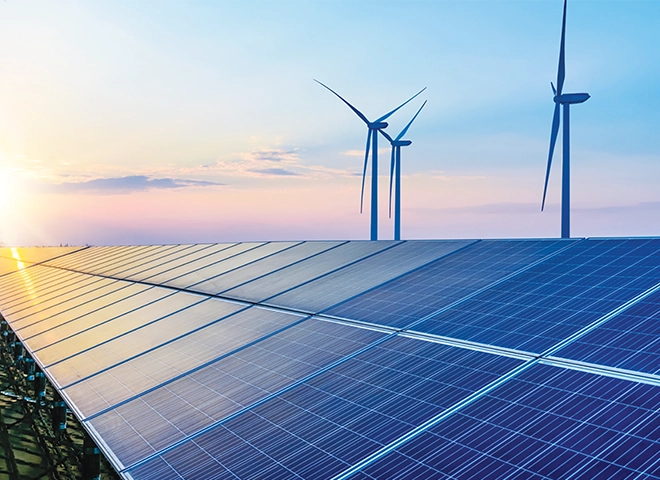ENVIRONMENT
As PEL continues its sustainability journey, it upholds its responsibility to reduce its carbon
footprint and embrace environmental stewardship.
UNFOLDING ENVIRONMENTAL STEWARDSHIP
Despite the demerger from the pharmaceutical business, PEL remains committed to a holistic approach to environmental sustainability, striving to utilise natural resources responsibly and create positive impacts. In its ongoing sustainability efforts, PEL has implemented various measures across its offices to minimise environmental impact.
The Company has made considerable progress in energy efficiency and resource conservation, continually exploring innovative ways to integrate sustainability into its operations. As it advances in its sustainability initiatives, the Company prioritises educating its employees on sustainable practices. This commitment reflects its dedication to fostering a culture of sustainability within its workforce, contributing to its overall environmental objectives and corporate responsibility goals.
Waste Management
To encourage the safe and conscientious handling of waste from its corporate offices, PEL has embraced the 5R waste hierarchy for managing resources such as paper and electronic waste, advocating for responsible usage and disposal practices. PEL proactively identifies outdated IT assets and employs top-notch recycling protocols for their disposal.
THE COMPANY HAS MADE CONSIDERABLE PROGRESS IN ENERGY EFFICIENCY AND RESOURCE CONSERVATION, CONTINUALLY EXPLORING INNOVATIVE WAYS TO INTEGRATE SUSTAINABILITY INTO ITS OPERATIONS.
Water Consumption
PEL acknowledges the significance of water conservation and pledges to advocate for sustainable practices. Our water usage is confined to offices and branches, wherein we introduced strategies to curtail consumption. This includes installing sensor-operated faucets in corporate office restrooms and closely tracking usage to pinpoint areas for enhancement. Looking ahead, we intend to investigate the feasibility of utilising recycled water in restrooms by FY 2025-26, with the aim of preserving water resources and minimising waste.
Energy Efficiency and Emission Management
PEL is dedicated to pursuing initiatives aimed at reducing emissions, improving energy efficiency, and optimising its energy sources, while aligning with its long-term sustainability goals established by the global scientific community. Most of the energy is consumed by electricity and fuel utilised in company-owned vehicles. To address this, the Company has implemented energy-saving measures such as installing LED lighting and signage boards and outfitting new branches with inverter air-conditioning using R-22 refrigerant.
Internally, PEL is evaluating the potential for installing efficient equipment and alternative energy sources at its branch offices. A solar plant generating 27.5 kWh of energy has been installed in Bengaluru, powering the entire office. Utilisation of video conferencing technology has enabled a reduction in air travel and associated emissions, while digital platform adoption is being actively pursued for several processes. In some locations where government grids supply power, the Company receives green bills.
PEL continuously monitors emissions and energy consumption trends to identify energy-saving opportunities, conducting phased energy audits across headquarters, regional offices, and branches.
Consideration is given to attaining green building certifications, retrofitting energy-efficient equipment, and deploying smart sensors for light and appliance control.
The implementation of a food service ware management company at Mumbai sites has resulted in significant environmental benefits, including a reduction of approximately 77,877 kilogrammes of CO2 emissions, preservation of 14,68,842 litres of fresh water, and diversion of 5,667 kilogrammes of waste. Moreover, substantial cost reductions of around 30% in operational expenses and over ₹ 32,00,000 in capital expenditure have been achieved. The Company is committed to establishing targets for reducing absolute greenhouse gas emissions (Scope 1 and 2), in accordance with SBTi (Science Based Targets initiative) requirements in the coming years.


SUSTAINABLE FINANCE
The global green finance market has experienced significant growth in response to the climate crisis and the impact of COVID-19. Investors and businesses now recognise the crucial role of the financial services sector in fostering a socially responsible economic recovery and facilitating the transition to a sustainable, low-carbon economy. As a leading NBFC providing construction finance, we specialise in providing loans to major developers, with a specific focus on financing projects that promote environmental sustainability and energy efficiency.
A key objective for the Company remains to support green building initiatives, and currently, we have 10* such projects in our portfolio. Additionally, we are also collaborating with an organisation to fund the manufacturing and assembly of electric buses. This initiative is projected to contribute over 100 million green kilometres and reduce 1 million metric tonnes of CO2 emissions across 8 states in India.
Note: (*) As on March 31, 2024



